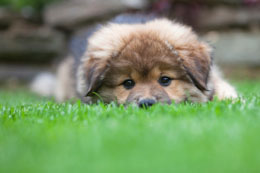If you have pets, then the use of pet safe lawn fertilizers is a necessity. Read on to know some tips to help guide you on how to use lawn fertilizers that are safe for your pets.

Many of the fertilizers and pesticides used for lawn care contain harmful chemicals. Pets have a habit of eating grass and so they end up accidentally consuming these chemicals. These chemicals can cause various health risks for your pet. Using pet safe fertilizers for your lawn can negate such problems. These days, such fertilizers are readily available in the market and are fairly cheap. Let us discuss some tips on making your lawn safe for your pets.
Tip #1: Healthy Soil
Healthy soil comprises bacteria, minerals, water, air, and organic fertilizers which can solve most lawn problems. So before you start growing a lawn, check the soil that is to be used. Soil tests done in the laboratory can reveal nutritional deficiencies in the soil, and thus, can help guide you with the fertilizers to be used. A healthy soil will improve the quality of grass, thereby elevating the resistance of the grass towards pests and insects, and you can easily avoid the use of harmful pesticides and insecticides. If you want to choose a ready-made organic fertilizer, see to it that you crosscheck the ingredients and choose one that is approved by the Environmental Protection Agency (EPA).
Tip #2: Organic Fertilizers
Organic fertilizers are the best option for lawn care when you have pets at home. These fertilizers help the grass grow naturally. They maintain a healthy environment as they are harmless for your pets. Organic fertilizers are made up of biodegradable substances like cow manure. Some other popular ingredients of organic fertilizers are kelp and worm castings. Organic fertilizers improve the natural resistance of the grass towards pests and insects.
Tip #3: Homemade Fertilizers
It is quite possible to make your own lawn fertilizer that is safe for pets. Almost all the ingredients required for this fertilizer are easily available. You can compost the waste products from your kitchen, which include fruit peels and leftover food. You can also use other materials like straw, dried leaves, wood chips, and nitrogen-rich greens. Composting is a process where biodegradable products are decomposed to form organic rich material. The procedure is quite simple and all you need to do is store any waste material and leave it to decompose naturally in the soil. The time required to decompose depends on the material that you are decomposing and the climate. Once you are sure that the biodegradable material is fully decomposed, you can use it as fertilizer. Tests have proven that such fertilizers are as effective as artificial fertilizers.
Tip #4: Pet-safe Weedkiller
If you are facing a weed problem in your lawn, take care that you choose a weed control option that is safe for your pet. Go for weedkillers that are recommended by your veterinarian. Check out the ingredients of the product and avoid using those containing inert materials. Inert ingredients are highly-toxic and include chloroethane, carbon tetrachloride, and chloroform. Making a weedkiller at home is the safest solution. All you need is a spray bottle, boiling water, and vinegar. Clove oil and citrus oil are optional ingredients. Add two parts of boiling water to one part vinegar and add any of the optional ingredients. Pour this mixture into the spray bottle and your pet safe weedkiller is ready. Spray this mixture on your lawn, most preferably in sunlight, to get better results.
Using environment-friendly fertilizers not only keeps your pets safe from harmful diseases, but also maintains a healthy environment around your home. All these fertilizers are organic in nature and they do not have any side effects.






 Many of the fertilizers and pesticides used for lawn care contain harmful chemicals. Pets have a habit of eating grass and so they end up accidentally consuming these chemicals. These chemicals can cause various health risks for your pet. Using pet safe fertilizers for your lawn can negate such problems. These days, such fertilizers are readily available in the market and are fairly cheap. Let us discuss some tips on making your lawn safe for your pets.
Many of the fertilizers and pesticides used for lawn care contain harmful chemicals. Pets have a habit of eating grass and so they end up accidentally consuming these chemicals. These chemicals can cause various health risks for your pet. Using pet safe fertilizers for your lawn can negate such problems. These days, such fertilizers are readily available in the market and are fairly cheap. Let us discuss some tips on making your lawn safe for your pets.